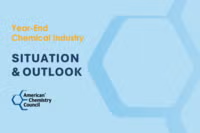WASHINGTON (November 16, 2022) — According to a new economic analysis conducted by the American Chemistry Council (ACC), most Americans would be severely impacted unless Congress acts quickly to prevent a rail strike and a subsequent shutdown of the nation’s freight rail network.
Fueling Inflation & Recession
The impact of a potential strike would be felt almost immediately in terms of business shutdowns, scarcity of materials and goods, and lost economic activity. According to ACC’s analysis, a strike lasting one month would likely put a major chill on several leading economic indicators through the first half of 2023:
- Job Loss: The U.S. economy would lose 700,000 jobs across multiple industries and economic sectors. These losses would essentially erase the job gains made over the past three months.
- Inflation Spike: The Producer Price Index (PPI) would jump by four percent. PPI measures inflation from the viewpoint of industry and is considered a leading indicator for consumer inflation. A four percent spike would represent a twentyfold increase over the latest PPI reading.
- Economic Slowdown: The Gross Domestic Product (GDP) would contract by one percentage point, which would pull almost $160 billion dollars out of the economy. To put this into perspective, during the financial meltdown in 2008, the economy lost $210 billion dollars through the first half of 2008.
A rail strike could shove the economy out of recovery mode and into a recession.
“A rail strike could shove the economy out of recovery mode and into a recession,” said Martha Moore, ACC’s chief economist. “A prolonged strike would have an exponential effect for each additional month and drag the country into a potential recession much faster.”
Congressional Action Needed
“Chemical manufacturers are one of the first industries that will be impacted as railroads start restricting service up to a week before a threatened strike,” said Chris Jahn, ACC’s president and CEO. “Freight rail transportation is vital for transporting chemicals critical to everyday life, including water treatment, energy production and food production. Shutting down chemical shipments by rail would quickly send shockwaves that would be felt through the entire economy and households across the country.”
U.S. chemical manufacturers are one of largest users of freight rail – shipping more than 33K carloads per week worth $2.8 billion. The specter of a strike comes at a time when companies are battling against major supply chain challenges related to persistent freight rail service problems.
To avoid a massive blow to a fragile U.S. economy, Congress must step-in before a strike occurs. That’s why ACC recently joined with hundreds of other business groups to call on policymakers to prevent a strike.
“American consumers and manufacturers are still struggling to deal with inflation and don’t need to be hit with a new crisis,” said Jahn. “This is an economic calamity that every member of Congress should be very interested in preventing and we call on policymakers to act quickly on legislation that will enact the terms that labor leaders and railroads agreed to in September.”


